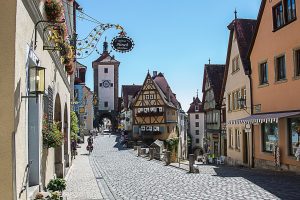Learning a new language will unlock a new world. This might be a cliché, but a very beautiful one. However, when learning the German language, a consensus is made. The language is very logical and structured. It is not easy, but at the same time, not very difficult to grasp.
When you learn German, you will understand that these people have thought of the minute details in our daily lives. German has meanings for specific feelings and acts which might never exist in another language.
Brought to You by
If all of the above do not convince you to learn the German language, then maybe the below facts and figures might do.
Countries with German as Official, Co-Official or Minority Language

The Deutsch or the German language is the official language in Germany, Austria and Liechtenstein. Moreover, it is a co-official language in Switzerland, Belgium and Luxembourg.
Numerically speaking, there are over 95 million people who speak German. Some optimistic estimate even stretch the figure well beyond the 100 million. This becomes particularly true when including the area of South Tyrol in Italy. People in this region are bilingual in Italian and German.
You Might Also Be Interested in:
On the other hand, many Slavic, Eastern and Central European nations have German as a minority language. Moreover, in such nations, German is taught at schools, institutes and universities. Also some neighboring countries like the Denmark, Czech Republic and Poland give high importance to the language.
On a more distant scale, particular areas in Brazil use the German language as a cultural means. These include Santa Catarina and Rio Grande do Sul. This dates back to historical events of German settlers in the country. These established the right German culture and language in Latin America.
Not surprisingly, an emerging African economy uses German as a co-official language. This is the country of Namibia where in 1884, it was a German colony, formerly known as German South West Africa. Later, South Africa assumed the role of ruling the nation till 1990. Consequently, many languages emerged in Namibia, but German never ceased to exist.
Benefits of Learning the German Language
View this post on InstagramA post shared by Smart Languages (@smartlanguages.mx) on
As with learning any new language, there are many major benefits. Namely, it adds to your skill set a new language under your belt. Moreover, the greatest thing about learning a language is that unlike technology, it does not get a lot of updates. Allow us to explain next.
Let’s say you’re learning a programming language or any computer related skill. Usually, in a matter of months, your acquired information would certainly need some updates to follow the trend. As technology pace is very fast, so does learning it.
On the other hand, learning a language, requires one initial investment of your time and efforts. Later, only practice is needed and no material changes will come to the language in years. Therefore, learning German will stick with you for the rest of your life. Additionally, it needs minimum maintenance to maintain this knowledge.
Characteristics of The German Language
Many testimonials about learning German state that the language is very logical. It is true that the language has noun genders and many annotations that may sound difficult at first. However, almost every English speaker claims that after a few weeks, he/she will definitely start seeing a sequence of logic in the language. This pattern makes learning it very exciting and an enriching experience.

German is a very descriptive language. Therefore, compound words are very common in it. Examples include: “Der Handschuh” literally meaning the “Hand Shoe” which is the “Gloves”. Another example that we like would be “Das Fernweh” or “The Distance Ache”. This is the passion to go out and explore new and distant places.
Babbel Magazine, has prepared a very interesting list of such compound words, you may find it here: Babbel Magazine List.
Facts about Germany Reflected in Its Language

Do you love living an orderly life among organized people? Then Germany is the place to be. This country is world famous for its industries and quality products in many fields.
Many engineers head to Germany to study the best and ultra modern mechanization methods at the highest quality standards.
You Might Also Be Interested in:
Best 7 European Countries for Studying Abroad
However, Germany is not only about industries and hard work. In fact, people have a lot of fun in this country and many experiences pop up according to regions and cultures.
Germany has always tried to attract the best talent from all corners of the globe in an attempt to formulate itself as a multicultural hub for innovation and diversity. Consequenlty, many universities offer excellent educational degrees at very affordable prices. These are very minimal in comparison to North American universities’ tuitions.
The catch is that German is the main educational medium in Germany. Even though English is widely spoken, nontheless, German universities expect students to have a decent level of the language. This in return would offer them great opportunities for postgraduate education and work.




